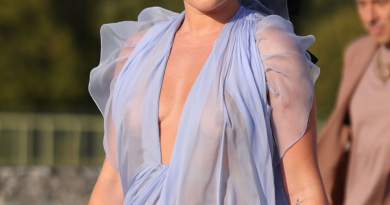On <i>SOS</i>, SZA Proves She's One of This Generation's Best Songwriters
In Shine Bright: A Very Personal History of Black Women in Pop, acclaimed cultural critic Danyel Smith writes, “Over the years, I have to believe people see quite clearly that Black pop shakes the foundation of white-is-right American music culture. And that’s why Black ‘crossover’ artists, murderers of the biz as usual, were flogged so relentlessly.” Though the quote references the backlash to the pop ambitions of a post-Supremes Diana Ross, it can easily apply to the contemporary plight of Black musicians not being thoroughly recognized as pop artists (see: how the genre-bending work of Doja Cat was initially often categorized as solely R&B). Perhaps Smith’s thesis is also why Black women in pop music are rarely celebrated, talked about and referenced for the ingenuity of their craft outside of their grandiose vocal performances.
Because in the “white-is-right American music culture,” Black women are only supposed to be the pretty performers. Not the masterminds behind the music making. It’s why Mariah Carey’s astute knack for vocal production and songwriting is often obscured by her enthralling five-octave range (she was finally inducted into the Songwriters Hall of Fame this year). It’s why Missy Elliott’s vast songwriting credits across R&B are treated as hidden facts instead of an extension of her innovative career. And it’s why SZA, born Solána Imani Rowe, is not yet widely acknowledged for being among the sharpest, most emotionally audacious songwriters of this generation regardless of genre.
SOS, the singer’s latest offering, is teeming with a dazzling array of lyrics that expose the depths of the singer’s angst and anxieties—positioning herself as a skilled musician who can translate the nuances of her insecurities into electrifying balladry. In turn, her music captures the most granular details of a young woman’s emotional turmoil that feel as real and tangible as looking at a reflection in the mirror. Whereas CTRL, her 2017 debut that criminally didn’t win any of the four Grammy awards it was nominated for, blared for its relatable lyricism that found her second-guessing herself and her relationships, SOS finds SZA exploring the nuances of her uncertainty and how they impact her actions.
Across 23 sprawling tracks, SZA’s songwriting effortlessly encapsulates the sting of her fury and the softest spot of her tenderness “Blind,” a song filled with lines that sound too succulent to be reduced to a track that’s fewer than three minutes long, is the apex of that lyrical style. In one verse she assures “you ain’t getting your bitch back” only to echo her embarrassment on going back to a past lover in another. Backed by acoustic guitar and viola, it’s a stellar revelatory moment that possesses the lyrical arrangement fit for a ballad. On the cinematic thriller “Kill Bill,” SZA explicitly divulges her desire to kill her ex and his girlfriend while acknowledging that her actions surprisingly stem from love (“I still love him though/Rather be in hell than alone,” she sings in the closing verse). If CTRL was about seeking answers for why she’s insecure, SOS is about embracing those insecurities and reeling from the consequences of them.
To further delineate that theme, she wafts through different genres as if she’s a best-selling artist in each of them. Perhaps she already is. Prior to the album’s release, she said, “It’s very lazy to just throw me in the box of R&B. I love making Black music, period. Something that is just full of energy. Black music doesn’t have to just be R&B. We started rock ‘n’ roll. Why can’t we just be expansive and not reductive?” The experimental layers of SOS position SZA as a seasoned stylist who’s as interested in her artistic growth as she is in her emotional growth. She unleashes a rap tirade against her exes on “Smoking on My Ex Pack,” collaborates with Phoebe Bridgers on an indie pop quest for validation on “Ghost in the Machine,” relishes in the punk-tinged joy of rebound sex on “F2F,” and croons about needing her ex on the folk ballad “Nobody Gets Me.”
This content is imported from youTube. You may be able to find the same content in another format, or you may be able to find more information, at their web site.
The darkest yet most riveting point of the album arrives on “Special.” Throughout the Benny Blanco-produced track, SZA completely drowns in a relatable stream-of-consciousness rumination on feeling undesirable. “Why’d you have to treat me/Like I was an ordinary girl?/I wish I was special/I gave all my special/Away to a loser/Now, I’m just a loser,” she wails.
But part of SZA’s appeal is her laid-back, ordinary aesthetic that’s typically reserved for white women. She dons baggy clothes and seems like the type of girl you’d regularly run into at a local gas station. In an industry where the tradition for Black female musicians is laced between sporting prim-and-proper attire that evoke elegance and raunchy outfits that embrace sexual autonomy, SZA is interested in neither. In a society where Black women are expected to be the saviors of their lives and others’, SZA lies in the messiness of it all. And that alone is special. It’s powerful. Throughout her career, the 33-year-old has created space for anxious Black girls who are rigorously trying to overcome their insecurities in a world that relentlessly picks them apart.
Could the sequencing on SOS be more strategic? Sure. Could songs like “Used” and “Far” sound more dynamic if they depicted her insecurities as richly as they’re outlined in the others? Perhaps. But SOS glistens in its emotional chaos. She’s the St. Louis-born, Maplewood, New Jersey-raised, former marine biology major who lyrically wields her low self-esteem and uncertainty so that a generation of women can reflect on their own. Nothing is ordinary about that. It’s brave. And it’s a talent that transcends genre.
DeAsia Paige is freelance music and culture writer whose work has been featured in Pitchfork, NPR Music, Teen Vogue, and more. Her writing primarily focuses on the intersection of race, culture and music. She’s a firm believer that there is a Real Housewives of Atlanta moment for everything. DeAsia is based in St. Louis, MO.





